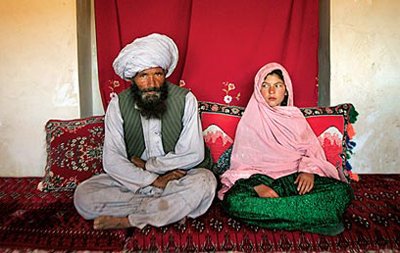By Deepali Gaur Singh
Unicef’s winner of the best picture in 2007 is a chilling reminder of the condition of the region’s child brides. Poverty may have made women and young girls more vulnerable, but the methods of exploitation they suffer take on an altogether different proportion in a country wracked by 30 years of unending conflict.

This sobering image, showing a 40-year-old groom sitting beside his 11-year-old future bride in Afghanistan, brought Stephanie Sinclair top honors in the annual Photo of the Year contest sponsored by the United Nations Children's Fund (UNICEF).
Photo: Stephanie Sinclair
The Photo of the Year is of an 11-year-old next to her 40-year-old fiancé in the Ghor province. The girl had been sold for money to be able to bring food on the table for the rest of her family. While the groom claimed he would send his young bride to school, the wise village women know better. They predict that the bride-to-be will be married soon after her engagement so as to immediately start bearing children for Faiz, the not-so-young groom.
The official legal age for marriage for girls in Afghanistan is 17. Yet, cultural, religious and mostly economic aspects of the communities make it nearly impossible for the girls to break free from marrying early. In rural Afghanistan young girls are rarely allowed out of their home, unless they are contributing labour on the fields or to get married. Thus these uneducated girls find themselves married off even before entering adolescence. According to estimates by the United Nations, 50 per cent of Afghan women are married much before they turn 18.
Child marriages are not uncommon in India either. In Rajasthan young children are married to each other, often even before entering their teens. But the dimensions of a young girl marrying a man of 40 are far more catastrophic.
Most of the times, these little girls are sold by their parents to pay-off long-standing debts or to be able to provide for the rest of the family. In Afghanistan, girls have had to repay debts incurred by poppy farmers on the forceful destruction of their standing crops (done to bring down the narcotics production in the country). Not only were these attempts going futile in the absence of any sustainable solution, but it also meant that the girls were doomed to the life of a slave to the debtors.
Violence manifests itself in a variety of ways, and women are very often at the receiving end. Domestic violence is not only astonishingly high in Afghanistan but is also gaining legitimacy, socially. As a result, the rate of suicides and drug addiction in a country where drugs are so easily available has also become quite high amongst these young brides.
Like in many parts of the region, women in Afghanistan are treated as property of men. They are practically slaves in their homes slaves who can be sold and resold, and traded for anything.
In one such case, in November 2006, a 11-year-old girl, Sanubar, was kidnapped by warlords and exchanged for a dog in northern Afghanistan. Another victim at a hospital in the Zabul province was treated after her husband cut off her ears and nose, broke her teeth and shaved her head within three months of marriage.
Despite the involvement of foreign troops in the removal of the Taliban, life has barely improved for women in most parts of the country. Women still fear for their safety in a country where warlords hold sway. As the curriculum of government schools teaches little girls that a woman is only worth half a man, self-immolation appears to have become the way out for many of these young brides a way out from the misery they endure everyday.



